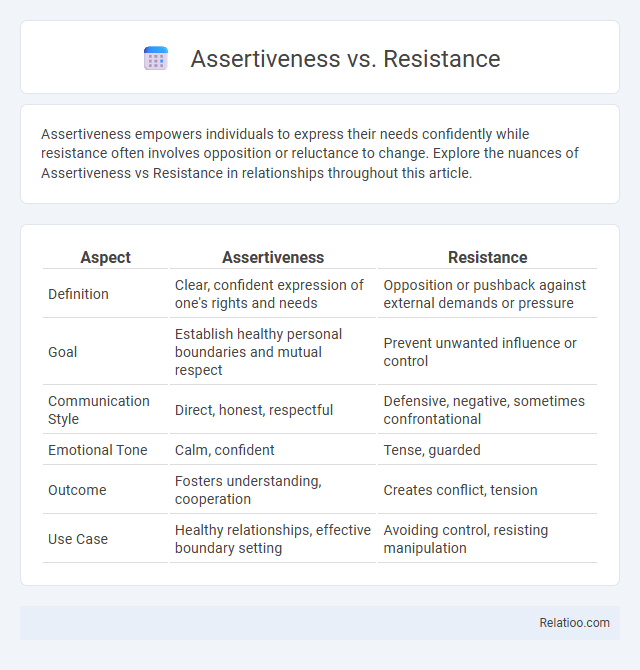Assertiveness empowers individuals to express their needs confidently while resistance often involves opposition or reluctance to change. Explore the nuances of Assertiveness vs Resistance in relationships throughout this article.
Table of Comparison
| Aspect | Assertiveness | Resistance |
|---|---|---|
| Definition | Clear, confident expression of one's rights and needs | Opposition or pushback against external demands or pressure |
| Goal | Establish healthy personal boundaries and mutual respect | Prevent unwanted influence or control |
| Communication Style | Direct, honest, respectful | Defensive, negative, sometimes confrontational |
| Emotional Tone | Calm, confident | Tense, guarded |
| Outcome | Fosters understanding, cooperation | Creates conflict, tension |
| Use Case | Healthy relationships, effective boundary setting | Avoiding control, resisting manipulation |
Understanding Assertiveness and Resistance
Assertiveness involves expressing thoughts and feelings confidently while respecting others, promoting clear communication and healthy boundaries. Resistance emerges as a reaction to change or perceived threats, often manifesting through opposition or avoidance to protect existing beliefs or comfort zones. Recognizing the difference between assertiveness and resistance enables individuals to navigate conflicts effectively and foster constructive dialogue.
Key Differences Between Assertiveness and Resistance
Assertiveness involves confidently expressing your thoughts and needs while respecting others, fostering clear communication and mutual understanding. Resistance, in contrast, often implies opposition or pushback that can be passive or active, potentially leading to conflict or stagnation. Understanding these key differences helps you maintain healthy boundaries without alienating others or escalating tension.
The Psychology Behind Assertiveness
Assertiveness in psychology involves expressing one's thoughts and feelings confidently while respecting others' rights, promoting healthy communication and self-esteem. Resistance, in contrast, typically reflects a defensive response to perceived threats, often hindering open dialogue and personal growth. Understanding the psychological mechanisms behind assertiveness helps individuals overcome passive or aggressive tendencies, fostering balanced interpersonal interactions.
The Roots of Resistance in Communication
The roots of resistance in communication often stem from fear of change, lack of trust, and perceived threats to personal values or autonomy. Assertiveness promotes open dialogue by expressing needs clearly and respectfully, while resistance manifests as defensive behaviors that block effective interaction. Understanding emotional triggers and underlying concerns is essential to transform resistance into constructive assertiveness.
Positive Outcomes of Assertive Behavior
Assertive behavior promotes clear communication, fostering mutual respect and cooperation in both personal and professional relationships. Unlike resistance, which often breeds conflict and stagnation, assertiveness empowers individuals to express needs and boundaries confidently, leading to constructive problem-solving and enhanced decision-making. This proactive stance contributes to increased self-esteem, reduced stress, and improved outcomes in negotiation and conflict resolution scenarios.
Negative Impacts of Resistance in Relationships
Resistance in relationships often leads to increased conflict and emotional distance, undermining trust and communication between partners. Persistent resistance can cause frustration, resentment, and a breakdown in cooperation, preventing healthy problem-solving and mutual understanding. Over time, this negative dynamic weakens emotional bonds and may result in relationship dissatisfaction or dissolution.
Recognizing Assertive vs Resistant Responses
Recognizing assertive responses involves identifying clear, confident communication that respects both personal boundaries and others' perspectives, characterized by open dialogue and firm yet polite language. Resistant responses often exhibit defensive or oppositional behavior, marked by refusal to engage, avoidance, or negative body language that signals discomfort or disagreement without constructive interaction. Understanding the distinctions between assertiveness and resistance allows for improved conflict resolution and fosters healthier interpersonal communication dynamics.
Strategies to Cultivate Assertiveness
Cultivating assertiveness involves mastering clear communication techniques that express one's needs and boundaries respectfully while maintaining confidence. Strategies include practicing active listening, using "I" statements to convey feelings without blame, and role-playing scenarios to build self-assurance in confrontational situations. Consistent self-reflection and seeking feedback also enhance assertiveness by reducing passive or resistant reactions, promoting effective interpersonal interactions.
Overcoming Resistance in Difficult Situations
Assertiveness involves clearly expressing thoughts and needs while respecting others, which can effectively reduce resistance in difficult situations by promoting open communication. Resistance often stems from fear, misunderstanding, or perceived threats, and overcoming it requires identifying underlying concerns and addressing them with empathy and clarity. Employing assertive techniques such as active listening and firm yet respectful dialogue can transform resistance into cooperation and constructive problem-solving.
Balancing Assertiveness and Flexibility
Balancing assertiveness and flexibility involves confidently expressing Your needs while remaining open to compromise and alternative solutions. Effective communication blends assertive statements with adaptive responses to resolve conflicts and foster collaboration. Mastering this balance enhances interpersonal relationships by promoting mutual respect and understanding.

Infographic: Assertiveness vs Resistance
 relatioo.com
relatioo.com